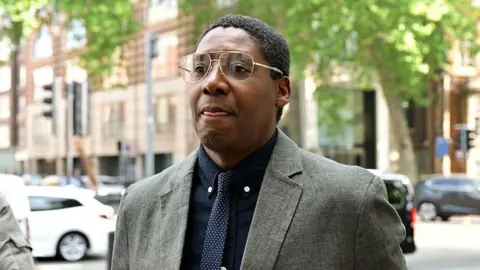In a remarkable turn of events, Oghenochuko Ojiri, a well-known art expert who made appearances on the BBC’s popular show “Bargain Hunt,” has recently pleaded guilty to charges related to terrorism financing. This marks a groundbreaking case, as it is the first prosecution of its kind in the United Kingdom for offenses under the Terrorism Act 2000. The news has sent shockwaves through the art community and beyond, raising questions about the implications of such activities.
Ojiri, who is 53 years old, admitted to eight counts of failing to disclose information during the course of his business dealings, specifically related to suspected financing of proscribed groups. The law mandates that individuals who suspect, or know, that their business associates may be involved in activities that support terrorism must report this information to the police. The alleged offenses are said to have occurred between October 2020 and December 2021, during which time Ojiri was functioning within the art market, communicating with various contacts and clients.
The Metropolitan Police’s specialist arts and antiques unit, in coordination with the Office of Financial Sanctions Implementation (OFSI) and Her Majesty’s Revenue and Customs (HMRC), conducted an extensive investigation into Ojiri’s financial dealings. The outcomes of this investigation led to the formal charges against him, revealing disturbing connections within the art world that may facilitate money laundering or further illicit activities.
Ojiri is associated with “Bargain Hunt,” where he has built a reputation as an expert in the field of art and antiques. However, it is essential to note that he is not a permanent member of the BBC staff; rather, he works as a freelance presenter. His participation in other notable shows such as “Antiques Road Trip” and Channel 5’s “Storage: Flog the Lot!” has contributed to his public persona. Despite his previous engagements, he has not appeared in any BBC productions since 2023, drawing speculation and concern regarding his professional network and practices.
Additionally, Ojiri is a notable figure in the east London art scene, having founded the Ramp Gallery—now rebranded as the Ojiri Gallery. This gallery was known as a contemporary art showroom, showcasing a variety of artistic expressions. Although his current predicament is likely to have significant effects on his reputation and business ventures, it highlights the complexities and potential vulnerabilities within the art market, particularly concerning accountability and ethical practices.
The implications of Ojiri’s guilty plea extend beyond individual responsibility. It raises broader questions about how the art community regulates itself and the risks associated with art transactions in facilitating financial misconduct. The art world often prides itself on a culture of discretion and confidentiality, but incidents like this provoke necessary discussions about transparency and compliance with financial regulations.
As this story continues to develop, authorities emphasize the importance of vigilance and reporting any suspicious activities within any professional field, including art and antiques dealing. The case serves as a stark reminder of the responsibility that individuals and businesses hold with respect to ethical practices and the legal requirements surrounding financial transactions.
This particular story has prompted media attention, and readers are advised to stay tuned for further updates as more information comes to light regarding Ojiri’s case and its repercussions for the art market as well as the broader implications for regulatory practices within creative industries. The public is encouraged to stay informed through platforms such as the BBC News app, which will provide real-time updates, ensuring that audiences are aware of developments in this significant case.



